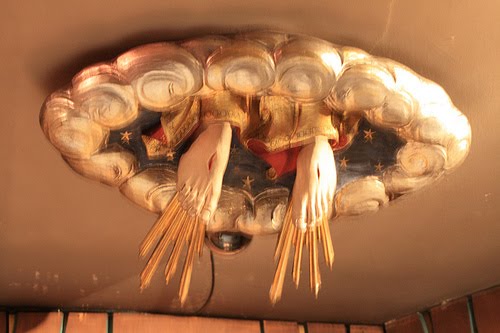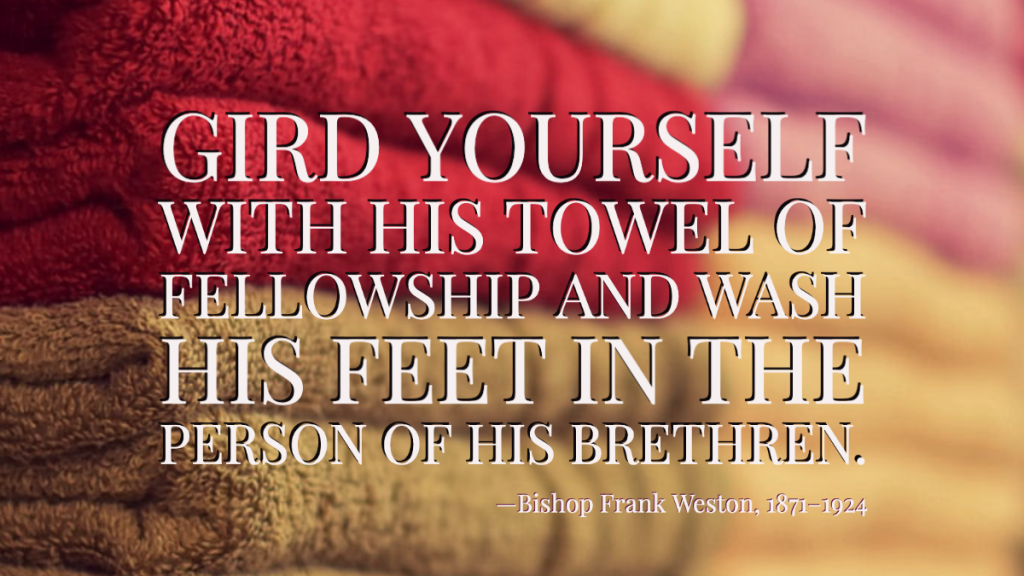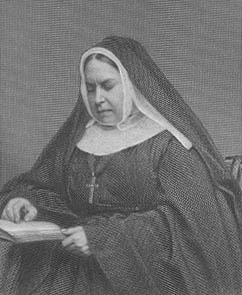The Ascension of the Lord – 21 May 2020
Gospel of the Day
Meanwhile, the eleven disciples were on their way to Galilee, headed for the mountain Jesus had set for their reunion. The moment they saw him they worshiped him. Some, though, held back, not sure about worship, about risking themselves totally.
Jesus, undeterred, went right ahead and gave his charge:
“God authorized and commanded me to commission you: Go out and train everyone you meet, far and near, in this way of life, marking them by baptism in the threefold name: Father, Son, and Holy Spirit. Then instruct them in the practice of all I have commanded you. I’ll be with you as you do this, day after day after day, right up to the end of the age.”
Matthew 28:16–20, The Message.

Get ready for the whoosh
Today we’re celebrating Christ going home to Heaven. His mission on earth is accomplished. The angels are cheering at His return. The souls that were waiting for many years, since the beginning of human history, for Jesus to come and re-open the way to Heaven are celebrating too from their new and eternal home.
We are also thanking Jesus for the first thing that He did, and now continues to do, as soon as He got back to Heaven. Our Lord Jesus Christ is now at His Father’s right hand for ever, asking Him to help us get to Heaven too, and everyone we love. Likes our Lord promised at the Last Supper, He and the Father are sending the Holy Spirit to help us to get home by bringing us grace. The Lord has ascended and now the disciples are waiting for the “whoosh” of the Holy Spirit.
In today’s First Reading, the disciples are still confused and have doubts, even though they have seen that the Lord has risen from the dead. They were expecting, like all of Israel expected, one big whoosh right away: they thought the Kingdom of Heaven was coming right now. They were waiting for one last bang and for everyone to be in Heaven and evil to be ended. They ask Jesus when it is going to happen. Jesus answers: wait for the Holy Spirit to come, and they still didn’t get it, which is why the angels have to tell them to move on. When Jesus tells them it is not for them to know the times or seasons, he’s teaching them what the whoosh of the Holy Spirit is like: unexpected and big. The disciples thought there would be one big whoosh and everyone would be in Heaven. Jesus is telling them to hold on to and be ready for the whoosh.
In today’s Epistle, St Paul prays that we, too, receive this “whoosh” of the Holy Spirit when Christ arrives home. This “whoosh” will bestow on us wisdom and revelation, not just on the level of knowledge, but in our hearts as well. St Paul describes where Our Lord is headed to day: to His Father’s right hand, where He’ll be put in charge of all things and be above all other powers. It also says He is being given to us, the Church, as head over all things.
In today’s Gospel, our blessed Lord prepared the disciples, and us, for Pentecost. He may be ascending soon, but the Holy Spirit is coming in force. In the Gospel today, and for the next days, we’re waiting for that first big whoosh of the Holy Spirit that came to the Church on Pentecost, which is what we’ll celebrate on Pentecost Sunday. Our Lord tells the Apostles to go out and baptise the whole world. When our Lord Jesus Christ was baptised, the Holy Spirit whooshed down on him. Whenever we receive the Sacraments, whenever we pray, and whenever we love each other the same thing happens to us.
The Holy Spirit also fulfils the promise our Lord made in the Gospel today: by the power of the Holy Spirit the bread and wine today in Mass will become the Eucharist—the Body and Blood of Christ—and Jesus will remain with us in the Eucharist “until the end of the age” when he will come with the last big whoosh that will bring us all home to Heaven.
✠ ✠ ✠ ✠ ✠
The whoosh of a garden hose
The whoosh of the Holy Spirit is like a garden hose: when you’re watering plants, or washing your car, or planning to play on your lawn, somebody has to turn on the hose, and somebody has to guide it, or the water goes splashing all over the place.
Our Lord Jesus Christ is ascending to Heaven to turn on the hose and let the Holy Spirit bring the flow of grace. That whoosh of the Holy Spirit comes out strong and in all kinds of ways: like water from a hose it cools you when you’re hot and thirsty, it washes away the dirt and sweat, and it wakes you if you’re sleepy. That all depends on you holding on to the hose and pointing it where it needs to go, or else everyone and everything just gets splashed and wet and you waste a lot of water
✠ ✠ ✠ ✠ ✠
Point the hose where it needs to go
If your parents tell you to wash your car, and you just have water fights on the the lawn, and get all wet, the car remains dirty, you are in big trouble, and the job doesn’t get done.
The Holy Spirit wants to do something with the whoosh, so you need to listen to him and point the right way for the grace He brings to be effective. We keep that “hose” steady so that the grace can do what God wants it to do, and it helps us and others get to Heaven. The Apostles guided the hose, and do do we: Jesus sent the Holy Spirit through the Apostles, to the other disciples, and to all the generations of disciples after them, and to us. The Holy Spirit whooshes in when we least expect it, so we must always be ready, we must live good lives so that we don’t block the hose by putting kinks in it and stopping the flow.
✠ ✠ ✠ ✠ ✠
Readings:
Acts 1:1–11; Psalm 47:2–3, 6–9; Ephesians 1:17–23, Matthew 28:16–20
Collect of the Day
Grant, we pray, Almighty God,
that as we believe your only-begotten Son our Lord Jesus Christ
to have ascended into the heavens;
so we in heart and mind may also ascend
and with him continually dwell;
who is alive and reigns with you and the Holy Spirit,
one God, now and for ever.
Jason Turner MStJ RIP
When I joined St John Ambulance Ireland as a member of staff, one of my first contacts in the organisation was Jason Turner. Throughout all my time working in the Operations Department, he had been there as an adviser to me in my work, first of all as deputy director of the operations department, then as director, and then subsequently as a district officer of SJAI.
I remember many occasions when he got me to help him with preparation for the Emergency Medical Technician courses for which he was responsible. He even had me having a go at some of the multiple choice questions. I had not done the course, but he did say that on paper I should be able to pass. He even got me in one Saturday to be a patient for the trainee EMTs.
Since December 2018, following the failure of my kidneys, Jason kept in contact with me wishing me well. In recent months, I became aware that he himself was not well. We messaged every so often via WhatsApp or Facebook. Indeed, the day he died, I had been thinking of him when I was on dialysis and had intended to ring him to speak to him that evening. It was not to be.
Today, I watched his funeral mass online via webcam. I was a bit surprised to see pall bearers from St John Ambulance Ireland given the COVID-19 restrictions that we are all living with, but I am sure they were keeping within the restrictions. At least they were showing civic leadership by wearing face masks while still maintaining the black and white uniform of St John Ambulance.
In due course, I hope to get an address for Jason’s widow, so that I can send her a card.
Jesus Christ is faithful, let us pledge our allegiance to him
Christ is faithful
During these Sundays of Eastertide, the Church takes us back to the Last Supper, giving us a chance to dig deeper into its meaning. We can use our imaginations to picture the scene. Our blessed Lord and the Twelve are in the Upper Room, gathered for the Passover. Our blessed Lord begins to tell them about His coming sufferings. He tells them that He will be leaving them to go back to the Father. We can picture the Apostles frowning in confusion, maybe beginning to feel a creeping sadness. They have staked their lives on Jesus! They have given up everything to follow him. And now, now he says that He must go way from them, and that they cannot follow where He is going.
Our Lord Jesus Christ knows their hearts. He knows their fears. Twice during the discourse He tells them, “Do not let your hearts be troubled.” He only repeats it because He knows that their hearts are truly troubled. He then makes them a promise. He says, “I will not leave you orphans; I will come to you.” He promises never to abandon his chosen followers. The crucifixion will come, the darkness, the suffering, the persecution, the apparent failure and defeat. But through all of it, the Apostles can cling with faith to this promise: I will not leave you orphans, I will never abandon you.
Our Lord Jesus Christ knows that our hearts too are troubled. He knows that we are filled with fear and confusion, with regret and sorrow in the midst of our own Good Fridays. He makes the same promise to us: I will not leave you orphans. I will come to you. I will be with you. His Resurrection is the first and definitive step in his fulfilment of this promise.
Our Lord Jesus Christ is faithful. We can count on that.
✠ ✠ ✠ ✠ ✠
St Zita perseveres
The life of St Zita illustrates the faithfulness of our Lord Jesus Christ. St Zita grew up near a beautiful town called Lucca, in north-central Italy, during the Middle Ages. Her family was poor but devout. When only twelve-years-old, she had to go to work as a live-in servant to one of the local noble families. She spent the rest of her sixty years serving that same family, living in that same house.
She always got up early enough to pray and go to Mass before beginning her day’s work. For this piety, her fellow servants continually made fun of her. And her efforts to be Christ-like through hard work and gentle manners made them laugh at her and ridicule her even more. And when she simply continued her humble and hard-working ways, they accused her of arrogance and stupidity.
But it got worse. For some mysterious reason, the master of the house despised her. He would fly into violent rages merely upon seeing her. The lady of the house felt the same. She would run St Zita ragged without even a touch of kindness.
For years, St Zita lived a prayerful and virtuous life. Yet God seemed to reward her with misery and maltreatment. But instead of becoming discouraged or angry with God, she remembered that our blessed Lord had also been mistreated, so she simply kept praying, working, and suffering with faith. Eventually, her quiet display of virtue won over the hearts of her persecutors, as did her tireless generosity to the poor—which more than once left the pantry bare at night, only to be miraculously replenished by the morning.
Hundreds more miracles were worked through her intercession after she died. Three hundred years later her body was exhumed and moved to a chapel in the little church where she used to go to Mass. The body was completely incorrupt. You can still visit it today in her chapel at Lucca. It’s as if our blessed Lord preserved it just to prove once again to all the world that He is faithful, even when no one else seems to be.
✠ ✠ ✠ ✠ ✠
Pledging allegiance to Christ
In today’s Mass, our Lord Jesus Christ is renewing His promise never to abandon us. We ought to thank him for that. Our Lord Jesus Christ is always with us. He is with us in our hearts, through the gift of the Holy Spirit that he poured into us at our confirmation. He is with us in the Eucharist, 24/7, whenever we need Him. He is with us in the Bible, the revealed Word of God that will always nourish our souls if we read it with faith. He is with us in the Church, the bark of Peter guaranteed to reach the heavenly shores.
Yes, our Lord Jesus Christ is truly with us. He has not left us as orphans. There is, however, a chance that we have made ourselves into orphans. Maybe we look like Christians on the outside, but still haven’t really become Christians on the inside. Maybe that is why we feel gnawing frustration or loneliness deep in our souls.
Today, our blessed Lord is giving us another chance, a new invitation to let him take up residence on the throne of our hearts, as St Peter puts it in the Second Reading, to “sanctify Christ as the Lord of our hearts.” There can only be one King in our hearts. Either ourselves, with our ignorance, our weakness, and our limitations, or Christ, with His infinite wisdom, His power, and His goodness.
Today, let us pledge our allegiance once again to Christ, the everlasting Lord.
Today, let us put our trust in His promise by promising to accept His will, even when it hurts; to follow His teaching, even when it is inconvenient and unpopular; and to take up our crosses with Christ, following Him all the way through the Crucifixion to the Resurrection. That is what the Apostles did: they had no regrets.
✠ ✠ ✠ ✠ ✠
Collect
Grant, almighty God, that we may celebrate with heartfelt devotion these days of joy, which we keep in honour of the risen Lord, and that what we relive in remembrance we may always hold to in what we do. Through our Lord Jesus Christ, your Son, who lives and reigns with you in the unity of the Holy Spirit, one God, for ever and ever. Amen.
Readings at Mass
Acts 8:5–8, 14–17; Psalm 66:1-7, 16, 20; 1 Peter 3:15–18; John 14:15–21
House churches in the early church
Fr Peter Anthony, Vicar of St Benet’s Kentish Town shares some thoughts about comparing the house churches of the early church with the current practice of Christians worshipping in their homes. Are they the same? Or are they different?
Christ in the Sacrament and in the Slum: Frank Weston
But I say to you, and I say it with all the earnestness that I have, if you are prepared to fight for the right of adoring Jesus in His Blessed Sacrament, then, when you come out from before your tabernacles, you must walk with Christ, mystically present in you, through the streets of this country, and find the same Christ in the peoples of your cities and villages. You cannot claim to worship Jesus in the tabernacle if you do not pity Jesus in the slum. … It is folly, it is madness to suppose that you can worship Jesus in the Sacrament and Jesus on the throne of glory , when you are sweating Him in the bodies and souls of His children. … You have your Mass, you have your altars, you have begun to get your tabernacles. Now go out into the highways and hedges, and look to Jesus in the ragged and the naked, in the oppressed and the sweated, in those who have lost hope, and in those who are struggling to make good. Look for Jesus in them; and when you have found Him, gird yourself with His towel of fellowship and wash His feet in the person of His brethren.
H. Maynard Smith, ‘Frank, Bishop of Zanzibar: Life of Frank Weston, D.D. 1871–1924’, London, 1926, p.302.

Bishop of Zanzibar from 1908 until his death, Frank Weston was a convinced Anglo-Catholic. He had an outstanding ministry in Africa but caused controversy by his protest against the recognition of the sacraments of non-episcopal churches at a missionary conference at Kikuyu in Kenya in 1913. In ‘Serfs of Great Britain’ he protested against forced labour in Africa. His social conscience was evident in his powerful speech as president to the Second Anglo-Catholic Congress a year before his death.
Holy Thursday – Mass of the Lord’s Supper: some thoughts
Being a Christian means more than being nice
Being a Christian means more than just being nice. It means centering our whole lives, every last detail, on a person: our Lord Jesus Christ. Other great religious leaders of history pointed to their teaching. They said, “follow my teaching’. Our Lord Jesus Christ points to himself. He said, “Follow me.”
When Jesus stood up from the supper table, wrapped that towel around his waist, and started washing the feet of the disciples, it was shocking for two reasons.
First of all, because of the nature of the task. In ancient Palestine, washing other people’s feet was a job reserved for slaves. By lowering himself to the level of a slave, our Lord is making it really clear to his Apostles, the first leaders of the Church, that the way of Christ is a way of self-giving, not self-indulgence. Our Lord never sought to get, but only to give. His followers are to do the same. That in itself goes far beyond simply being nice.
Secondly, he was disrupting the sacred ritual of the most hallowed ceremony in Jewish tradition: the Passover Seder, the ceremony that God had commanded Moses to institute to commemorate the miraculous escape of the Israelites from Egypt. God himself had established the rules of that ceremony, Jesus deviated from them, added to them, just as he did when he instituted the Eucharist. Clearly, our Lord sees himself as more than just another teacher or prophet, on the same level as Moses. Only God himself can alter God’s commands.
And so, when the foot-washing is over and he says to the Apostles, “You call me ‘teacher’ and ‘master’” his claim is clear. Yes, he is a great teacher, but he is also the Lord.
We are Christians not just because we accept a creed, not just because we accept the catechism, not just because we accept the prayer book, not just because we are nice: no, we are Christian because we have accepted a person. We have made our relationship with our Lord Jesus Christ the most important thing in our lives.
✠ ✠ ✠ ✠ ✠
St Clare of Assisi and the Eucharist
Today, by reminding us that being a Christian means much more than just being nice, we are invited to renew our personal commitment to Jesus Christ. We have to renew that commitment continually because our friendship with him is always under attack. Our own selfish tendencies and the self-indulgent culture around us are trying constantly to undermine our relationship with him.
God knew this would be the case. That’s one of the reasons that at the same time he commanded us to follow him, he also gave us the strength to do so, in the Eucharist. In the Eucharist, Christ himself wants to be our firm defence against all attacks.
St Clare of Assisi had a powerful experience of this reality. St Clare was a disciple of St Francis of Assisi. She founded the first convent of Poor Clare nuns at the church of San Damiano, just outside the city walls of Assisi. Very soon she became recognised and revered as a saint.
About that time, the whole region was being terrorised by mercenary armies heard by the Emperor to conquer Italy. As one of these armies approached Assisi, the town panicked as they had no army of their own, no protection at all.
As the soldiers climbed the small hill towards the city gates, they had to pass by St Clare’s convent. Before they arrived, St Clare, sick and confined to bed as she was, had herself and her mattress carried outside and placed on the top of the convent wall, overlooking the road that the soldiers would have to use. She also had the Blessed Sacrament brought out and place there inside a small, golden container called a pyx. As the soldiers came into view, she prostrated herself before our Lord in the Blessed Sacrament and prayed for deliverance. The other sisters did the same inside the convent chapel.
The soldiers continued to advance. And then, as they did so, mysteriously cries broke out among them. Some of them drew their swords and attacked their fellow soldiers. Others fled in terror. Soon the entire army was retreating in chaos, even though no one could be seen pursuing them.
Our Lord in the Blessed Sacrament had protected them. Our Lord today wants to do the same for us. He does not want us to try and fight all alone as if we were trying to follow some great philosopher. In our day-to-day battle to be faithful to him and to spread his Kingdom, he wants to be our Strength, our Shield, and our Sustenance.
✠ ✠ ✠ ✠ ✠
Doing a spiritual check-up
Each one of us is watching Mass today because Christ has somehow stirred our hearts. We have heard his call, we have heard his invitation. We want to follow him, perhaps imperfectly, but still, we want to follow him. We believe in him. We know that following our Lord Jesus Christ we will discover the meaning, joy, and fruitfulness that no one else can give.
At the same time, when we look into our hearts, we know that we are not following him as fully as we should. How can we follow him better? How can we make the real centre of our lives. We can start with something simple. We can do a spiritual check-up.
Today we start the Holy Triduum, the three days when we particularly celebrate our Lord’s passion, death, and resurrection. These are special days for the whole of the Church, and they have been since the very beginning. Let us take advantage of these days, particularly in this strangest of Holy Weeks, let us carve out some time from our busy schedules. Let us spend some quality time with our Lord in prayer, reflecting on what kind of a friend he has been to us this past year, and reflecting on what kind of a friend we have been to him.
This year, we are all separated from physically being at Mass, being at the watch with our Lord this evening, but there are plenty of online resources, as well as our own prayer books at home.
If we take some time in these days to do that spiritual check-up, if we ask him to help us, he will surely show us one or two things that we can do to be more authentic Christians. And then, on Easter Day, when the bright light of the Resurrection shines in our souls, we will find ourselves more centered on Christ, closer to him, and closer to the happiness he has in mind for us.
✠ ✠ ✠ ✠ ✠
The Paschal sacrament brings together in unity of faith those who are far away
| From an Easter letter by Saint Athanasius, bishop |
|---|
Brethren, how fine a thing it is to move from festival to festival, from prayer to prayer, from holy day to holy day. The time is now at hand when we enter on a new beginning: the proclamation of the blessed Passover, in which the Lord was sacrificed. We feed as on the food of life, we constantly refresh our souls with his precious blood, as from a fountain. Yet we are always thirsting, burning to be satisfied. But he himself is present for those who thirst and in his goodness invites them to the feast day. Our Saviour repeats his words: If anyone thirsts, let him come to me and drink.
He quenched the thirst not only of those who came to him then. Whenever anyone seeks him he is freely admitted to the presence of the Saviour. The grace of the feast is not restricted to one occasion. Its rays of glory never set. It is always at hand to enlighten the mind of those who desire it. Its power is always there for those whose minds have been enlightened and who meditate day and night on the holy Scriptures, like the one who is called blessed in the holy psalm: Blessed is the man who has not followed the counsel of the wicked, or stood where sinners stand, or sat in the seat of the scornful, but whose delight is in the law of the Lord, and who meditates on his law day and night.
Moreover, my friends, the God who first established this feast for us allows us to celebrate it each year. He who gave up his Son to death for our salvation, from the same motive gives us this feast, which is commemorated every year. This feast guides us through the trials that meet us in this world. God now gives us the joy of salvation that shines out from this feast, as he brings us together to form one assembly, uniting us all in spirit in every place, allowing us to pray together and to offer common thanksgiving, as is our duty on the feast. Such is the wonder of his love: he gathers to this feast those who are far apart, and brings together in unity of faith those who may be physically separated from each other.
Contemplating the Lord’s passion
Contemplating the Lord’s passion
True reverence for the Lord’s passion means fixing the eyes of our heart on Jesus crucified and recognising in him our own humanity.
The earth – our earthly nature – should tremble at the suffering of its Redeemer. The rocks – the hearts of unbelievers – should burst asunder. The dead, imprisoned in the tombs of their mortality, should come forth, the massive stones now ripped apart. Foreshadowings of the future resurrection should appear in the holy city, the Church of God: what is to happen to our bodies should now take place in our hearts.

No one, however weak, is denied a share in the victory of the cross. No one is beyond the help of the prayer of Christ. His prayer brought benefit to the multitude that raged against him. How much more does it bring to those who turn to him in repentance.
Ignorance has been destroyed, obstinacy has been overcome. The sacred blood of Christ has quenched the flaming sword that barred access to the tree of life. The age-old night of sin has given place to the true light.
The Christian people are invited to share the riches of paradise. All who have been reborn have the way open before them to return to their native land, from which they had been exiled. Unless indeed they close off for themselves the path that could be opened before the faith of a thief.
The business of this life should not preoccupy us with its anxiety and pride, so that we no longer strive with all the love of our heart to be like our Redeemer, and to follow his example. Everything that he did or suffered was for our salvation: he wanted his body to share the goodness of its head.
First of all, in taking our human nature while remaining God, so that the Word became man, he left no member of the human race, the unbeliever excepted, without a share in his mercy. Who does not share a common nature with Christ if he has welcomed Christ, who took our nature, and is reborn in the Spirit through whom Christ was conceived?
Again, who cannot recognise in Christ his own infirmities? Who would not recognise that Christ’s eating and sleeping, his sadness and his shedding of tears of love are marks of the nature of a slave?
It was this nature of a slave that had to be healed of its ancient wounds and cleansed of the defilement of sin. For that reason the only-begotten Son of God became also the son of man. He was to have both the reality of a human nature and the fullness of the godhead.
The body that lay lifeless in the tomb is ours. The body that rose again on the third day is ours. The body that ascended above all the heights of heaven to the right hand of the Father’s glory is ours. If then we walk in the way of his commandments, and are not ashamed to acknowledge the price he paid for our salvation in a lowly body, we too are to rise to share his glory. The promise he made will be fulfilled in the sight of all: Whoever acknowledges me before men, I too will acknowledge him before my Father who is in heaven.
from a sermon by St Leo the Great.
Mother Harriet Monsell of Clewer

from Wikimedia Commons.
Today, the Church of England commemorates Harriet Monsell of Clewer.
Of Irish parentage, Harriet Monsell (née O’Brien) was born in 1811. After the death of her clergyman husband, she went to work in a penitentiary at Clewer near Windsor. Here, she was professed as a a Religious in 1852 and became the first Superior of the Community of St John the Baptist. The community grew rapidly under her care carrying out a range of social work in a variety of locations with foundations in India and America by the 1880s. The sisters cared for orphans, ran schools and hospitals, and opened mission houses to parishes. In 1875 Mother Harriet retired as Superior through ill-health, moving to a small hermitage in Folkestone, where she died on Easter Day 1883.
Today, the Community of St John the Baptist continues with the sisters in the UK living at Ripon College, Cuddesdon offering their gifts to God in various ways including parish and retreat work, spiritual direction, and ministry to the elderly.
You can find out more about the sisters’ life now by visiting their website.
Feast of the Annunciation of our Lord to the Blessed Virgin Mary
Do not be afraid
One of the constant refrains in the Gospels is the admonition of Our Blessed Lord Jesus Christ: “Do not be afraid.” When the Lord draws near, it is our natural tendency to be afraid. We can be afraid of his presence. We can be afraid of what he might ask of us. We can be afraid of our limitations in the face of the call to true conversion and holiness of life. We can be afraid of our apparent obstacles along the path of our Christian discipleship. As our confidence in God increases, our fear decreases. As our love increases, our fear disappears. Of what are we afraid in our relationships with the Lord? Are we surrounding our fear by giving ourselves in faith?
Henry Tanner’s Annunciation

Henry Tanner created a remarkable painting of the angel Gabriel’s annunciation of the Incarnation. On the left-hand-side of the painting we see a column of light representing Gabriel. On the right-hand-side we see a young girl sitting on a simple bed. From the expression on her face, we see that she was not expecting this encounter, we see that her life is about to undergo a dramatic change. Her hands are clasped together, her face reflects both a curious mixture of uncertainty and a dauntless trust in what God is asking her through the angel’s words.
When God asked the Blessed Virgin Mary to become the Mother of Christ, she said, “Yes.” This was not an easy affirmation; she had not idea what her consent would imply.
However, the Blessed Virgin Mary remembered why. God was calling her: God would give her the strength that she would need. The Blessed Virgin could offer her life in service without knowing the reward, since love is its own reward.
Henry Tanner’s remarkable painting today hangs in the Philadephia Museum of Art. The painting reminds us that whether it is a summons from an angel or a cry from a cranky infant, or a call to help someone in need because of COVID-19, if we remember the “why” behind our action, then that action becomes a prayer.
Our Lady of Walsingham, pray for us.













